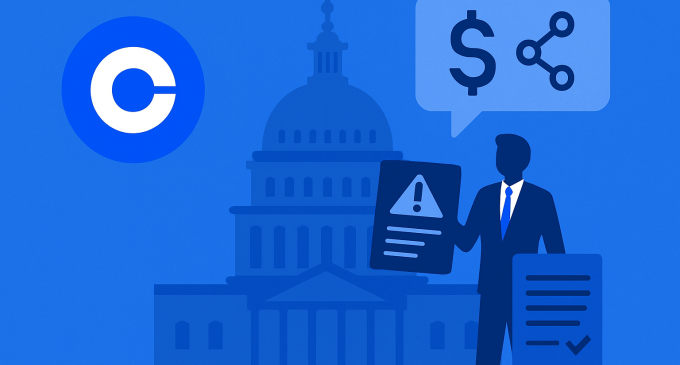
Introduction
In a bold and coordinated lobbying campaign, leading U.S. cryptocurrency exchange Coinbase has ramped up its call for urgent regulatory reform by pushing for the passage of the CLARITY Act—a landmark bill aimed at defining the legal framework for digital assets in the United States. The company’s leadership, in collaboration with advocacy groups and allied fintech firms, is urging lawmakers to support what it describes as a foundational shift toward a more transparent and innovation-friendly regulatory environment for cryptocurrencies and blockchain technologies.
As the crypto industry continues to grapple with fragmented regulation, increased enforcement actions, and jurisdictional uncertainty, the CLARITY Act offers a potential path toward cohesive legislation. With Coinbase taking center stage in this effort, the political dynamics in Washington are intensifying, signaling a possible turning point for the digital asset market.
Understanding The CLARITY Act: What It Proposes And Why It Matters?
The CLARITY Act—short for “Clear Laws and Regulations for Innovation in Technology and You”—has been proposed as a bipartisan legislative solution to long-standing confusion surrounding how digital assets should be categorized and regulated under U.S. law. At its core, the bill aims to distinguish between different types of tokens (such as commodities vs. securities) and provide precise definitions for market participants, including exchanges, wallet providers, and developers.
Key features of the CLARITY Act include:
- A formal classification framework for digital assets based on functionality and decentralization.
- A process for crypto projects to self-certify compliance and register with appropriate regulators.
- A mandate to coordinate oversight between the Securities and Exchange Commission (SEC), Commodity Futures Trading Commission (CFTC), and other federal bodies.
- Provisions to encourage innovation while imposing clear guidelines for consumer protection and anti-money laundering (AML) compliance.
For years, the lack of such clarity has stifled innovation in the U.S., forcing numerous crypto startups to relocate offshore. Coinbase, having remained committed to U.S. markets despite regulatory pressure, now positions the CLARITY Act as a lifeline for the domestic blockchain ecosystem.
Why Coinbase Is Leading This Lobbying Campaign?
Coinbase has long championed the cause of crypto regulation reform, arguing that compliance ambiguity is harming both businesses and investors. The company has endured numerous public legal battles with the SEC and has consistently called for more transparent rules.
Under the leadership of CEO Brian Armstrong, Coinbase has significantly expanded its policy and legal teams, establishing a strong presence in Washington, D.C. The company has also collaborated with other blockchain companies and nonprofit organizations like the Crypto Council for Innovation and Blockchain Association to amplify its advocacy efforts.
This recent lobbying campaign is perhaps Coinbase’s most aggressive push yet. It features:
- Direct meetings with members of Congress from both parties.
- Public advertisements and op-eds emphasizing the need for regulation.
- Social media campaigns urging crypto users to contact their elected representatives.
- Detailed whitepapers outlining the technical and economic benefits of the CLARITY Act.
Coinbase is leveraging its brand credibility and user base of over 100 million verified users to push lawmakers toward swift legislative action. For the exchange, the stakes are high—not just for market expansion, but also for its long-term viability in the U.S. under a clear and manageable regulatory regime.
Industry Response To The CLARITY Act
The broader crypto industry has largely welcomed the CLARITY Act. Many startups and venture capital firms have expressed support for a law that simplifies compliance requirements while legitimizing crypto operations.
Prominent voices like Ripple Labs, Circle, a16z Crypto, and Block.one have either formally endorsed the bill or praised its objectives. For these stakeholders, the promise of legal certainty could unlock new funding, improve hiring confidence, and accelerate product launches in the U.S. market.
However, not everyone is on board. Critics argue that the CLARITY Act could still leave too much power in the hands of regulatory agencies like the SEC and CFTC. Some privacy advocates fear the bill may impose invasive know-your-customer (KYC) requirements on decentralized protocols, potentially stifling Web3 innovation.
Despite these concerns, the overwhelming sentiment within the industry is that the bill marks a constructive step toward bridging the gap between Washington and Silicon Valley.
Political Landscape And Congressional Momentum
The timing of Coinbase’s lobbying blitz is no coincidence. With elections approaching in late 2025 and crypto ownership among voters at an all-time high, the issue of digital asset regulation is finally gaining traction on Capitol Hill.
Several influential lawmakers—including Senator Cynthia Lummis (R-WY) and Representative Patrick McHenry (R-NC)—have already voiced support for the CLARITY Act. A bipartisan coalition is reportedly working to bring the bill to committee review before the summer recess.
Moreover, recent legal setbacks for the SEC in high-profile cases have weakened the agency’s stance on regulating crypto by enforcement, further fueling support for legislative alternatives.
According to leaked memos from lobbying groups, over 45 members of Congress have indicated they are “open” to discussing the bill, with at least 15 cosponsors already on board. If passed, the CLARITY Act could become the most consequential piece of crypto legislation ever introduced in the U.S.
Implications For U.S. Crypto Businesses And Innovation
If the CLARITY Act becomes law, the implications for the U.S. crypto ecosystem would be far-reaching. Not only would it provide the legal certainty needed to attract institutional investment, but it would also likely spark a resurgence in domestic crypto startups.
Some of the most immediate changes would include:
Easier onboarding for exchanges: Platforms like Coinbase, Kraken, and Gemini could expand their offerings without fear of retroactive enforcement actions.
Investor protection clarity: Retail and institutional investors would benefit from consistent disclosures, standardized reporting, and better legal recourse.
Cross-border compliance: U.S.-based firms would gain leverage in negotiating with international regulators under a formal domestic framework.
Stablecoin guidelines: Issuers like Circle and Tether would have a roadmap for launching regulated digital dollars in partnership with banks and payment firms.
Additionally, developers of decentralized finance (DeFi) platforms, NFT marketplaces, and Layer 1 blockchains could operate more openly in the U.S., reversing the brain drain that has plagued the sector for years.
What This Means For Crypto Investors And The Public?
For everyday crypto users and investors, the CLARITY Act may bring about a new era of trust and transparency. One of the long-standing criticisms of the crypto market has been its volatility and susceptibility to scams—often due to unclear regulations or lack of accountability.
By mandating consistent registration, audit requirements, and disclosures for token issuers and exchanges, the bill could help legitimize the entire space. This may lead to:
- More robust protections for retail investors.
- Enhanced due diligence practices.
- Fewer “rug pulls” and fraudulent projects.
- Better integration of crypto into traditional financial systems.
Coinbase’s campaign has also emphasized that regulatory clarity could lead to more product innovation—including tokenized equities, crypto-based retirement accounts, and improved payment infrastructure for global remittances.
Conclusion
The passage of the CLARITY Act is not guaranteed, but the scale and intensity of Coinbase’s lobbying push represent a watershed moment for the industry. After years of battling with regulators in courtrooms and on social media, the crypto sector may finally achieve the legislative recognition it has long sought.
The next few months will be critical. Lawmakers, regulators, and industry leaders will need to collaborate, compromise, and legislate with an eye toward balancing innovation with public interest.
Coinbase has positioned itself not just as a business trying to survive regulatory scrutiny—but as a pioneer leading the charge toward a future where digital finance is both regulated and thriving. The crypto community will be watching closely, and the decisions made now may shape the trajectory of global finance for decades to come.







There are no comments at the moment, do you want to add one?
Write a comment